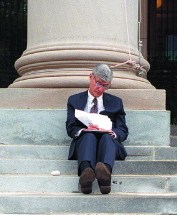The President and Fellows of Harvard Collegeas the seven-member, self-perpetuating Corporation, the University's senior governing board, is formally knownis in the midst of unusually swift and extensive change. On April 7, Robert E. Rubin '60, LL.D. '01, became the newest Fellow, with the consent of the Board of Overseers; he will fill the opening created by the retirement of Robert G. Stone Jr. '45, then Senior Fellow, at the end of June (see "First Fellow's Farewell," March-April, page 66). The responsibilities of Senior Fellow will pass to James R. Houghton '58, M.B.A. '62, recently renamed CEO of Corning Glass, who joined the Corporation in 1995.
Two days before Rubin's appointment was announced, a new vacancy was created when Herbert S. Winokur Jr. '65, Ph.D. '67, announced his resignation as a Fellow, also effective at the end of the academic year. Winokur, who is chairman and chief executive officer of Capricorn Holdings Inc., an investment firm based in Greenwich, Connecticut, has been much in the news because of his service as a director of Enron Corporation since the firm was created in 1985. A member of Enron's finance committee, he was also one of three members of an internal investigative committee of Enron directors who documented the use of off-the-books partnerships and irregular accounting practices that inflated the company's reported earningssubjects on which he was called to testify before Congress in February.
 |
| Rubin tightened his 2001 Commencement text on the Widener steps last year. |
| Photograph by Justin Ide / Harvard News Office |
Winokur joined the Harvard Corporation in July 2000, one of two new members who began service then (see "Refreshing the Fellows," May-June 2000, page 64). He notified President Law-rence H. Summers by letter that he was "concerned that my Enron involvement is in some ways diverting attention from your agenda for Harvard" and stressed that he "[did] not wish to be a distraction in any way from your efforts." Summers responded that he was "saddened by the circumstances that have prompted [Winokur's] decision to step down" and thanked him for serving Harvard "with devotion and intelligence."
Rubin's appointment represents something of a reunion. When he was U.S. Secretary of the Treasury from 1995 to 1999, Summers served as his deputy. After Rubin left the government, Summers was appointed his successor. (The working relationship formed between Rubin and Summers was reported in the magazine's profile of Summers upon his selection as Harvard's president; see May-June 2001, page 30.)
Rubin has had and maintains a career at the very pinnacle of world finance. A summa cum laude economics student at Harvard, he subsequently studied at the London School of Economics and received an LL.B. from Yale Law School in 1964. After practicing law for two years, he joined Goldman, Sachs & Company, where he rose to vice chairman and co-chief operating officer from 1987 to 1990, and then to co-senior partner and co-chairman from 1990 to 1992. During the first two years of the Clinton administration, he headed the National Economic Council, before moving across the street to the Treasury Department. After resigning from the cabinet, he joined Citigroup Inc., where he is chairman of the executive committee and a member of the office of the chairman.
A reserved speaker known for his dry wit, Rubin has been visibly involved in Harvard affairs of late. He delivered the Commencement afternoon address last year, speaking about decisionmaking in a complex world and the value of public-service careers. This April, at the end of the week when he was named Fellow, he keynoted a campus symposium on globalization.
In a statement, Summers said of his former colleague's role on the Corporation, "Obviously, Bob Rubin is someone for whom I have the deepest respect. I know from experience that his wisdom and judgment, as well as his understanding of how complex organizations work, will serve the University extremely well." Rubin hailed Harvard as "a great universitya truly global resourcethat plays an enormous role in furthering inquiry, understanding, and debate across the entire spectrum of intellectual pursuits." He expressed pleasure at "the opportunity to contribute to that important mission, and to work with Larry Summers and his colleagues on the Corporation and in the Harvard community in thinking about Harvard's future opportunities, directions, and challenges."
With a successor to Winokur still to be chosen, the lineup of those Corporation colleagues remains incomplete, and further change is possible. Treasurer D. Ronald Daniel, M.B.A. '54, a Corporation member since 1989, and Hanna H. Gray, Ph.D. '57, LL.D. '95, a Fellow since 1997, may consider retiring in the not-distant future. But given the relatively recent transitions in Harvard's presidency and on the collegial Corporation itself, they may remain to provide continuity atop the University's governing structure.




